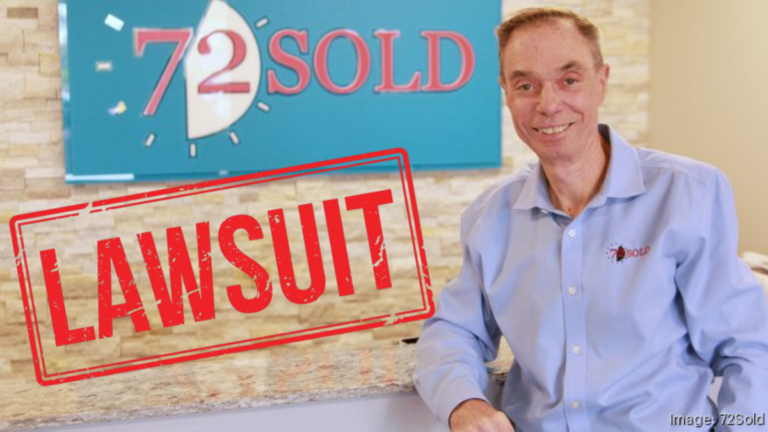As a home owner, you’ve in all likelihood encountered classified ads for 72 Sold, a actual estate company promising to promote your house in only 72 hours. However, current felony traits have cast a shadow over this revolutionary business model. The 72 Sold lawsuit has sparked severe debate in the actual estate industry and raised essential questions about customer protection. In this newsletter, you’ll gain perception into the prison intricacies of this situation, understand its ability implications for the real estate marketplace, and learn how it could affect your future domestic-promoting decisions. Join us as we delve into the complexities of this landmark lawsuit and its a long way-achieving results.
Background at the 72 Sold Lawsuit
Origins of the Controversy
The 72 Sold lawsuit has its roots within the evolving real property landscape, in which modern home-selling techniques have come beneath expanded scrutiny. 72 Sold, a actual property consulting business enterprise, promised to sell properties inside 72 hours, attracting homeowners in search of quick income. However, this rapid-fireplace approach quickly became the point of interest of legal challenges, with customers accusing the business enterprise of carrying out deceptive advertising practices.
Key Allegations
The crux of the lawsuit revolves around numerous crucial claims:
- Misleading Promises: Consumers allege that 72 Sold’s guarantees of promoting houses inside 72 hours were no longer trustworthy and didn’t as it should be represent the complexity of the sales technique.
- Pricing Discrepancies: Despite claims of above-common sale costs, house owners pronounced receiving decrease-than-predicted offers.
- Lack of Transparency: The lawsuit increases concerns about the clarity of 72 Sold’s fee structure and contract phrases, with a few customers claiming they had been not completely knowledgeable about associated prices.
- Pressure Tactics: Homeowners assert that 72 Sold used competitive techniques to push them into accepting brief gives without good enough time for attention.
Potential Implications
The final results of this lawsuit may want to have a ways-accomplishing outcomes for the actual property industry. If the allegations are confirmed, it is able to result in:
- Financial consequences and reimbursement for affected homeowners
- Mandatory changes to 72 Sold’s operational and advertising practices
- Increased scrutiny of actual property marketing strategies industry-wide
- Potential regulatory reforms to beautify purchaser protection in actual estate transactions
This case serves as a stark reminder of the importance of transparency and ethical practices in the ever-evolving actual estate market.
Plaintiffs’ Allegations Against 72 Sold
Misleading Advertising Claims
The plaintiffs in the 72 Sold lawsuit allege that the enterprise engaged in misleading advertising practices, making misleading promises about domestic sale prices and timelines. A key grievance is that 72 Sold’s marketing created unrealistic expectations, promising to sell homes within 72 hours and at above-market costs. However, many owners declare these consequences did no longer materialize, main to financial losses for the ones counting on quick income.
Pricing and Timeline Discrepancies
Critics argue that 72 Sold’s claims of selling houses quicker and at top class charges are faulty. Some plaintiffs report receiving offers nicely underneath market fee, contradicting the corporation’s advertising and marketing claims. Additionally, the lawsuit highlights widespread discrepancies between the promised seventy two-hour sale timeline and the actual time taken to promote properties.
Alleged Violations of Real Estate Regulations
The lawsuit accuses 72 Sold of potentially violating local and nation actual property laws associated with disclosure, transparency, and agent qualifications. Plaintiffs declare that 72 Sold did not absolutely reveal fee and charge structures, leading to customers paying extra than expected. These allegations improve questions about the employer’s compliance with enterprise regulations and requirements.
Consumer Protection Concerns
The lawsuit alleges that 72 Sold’s marketing practices violate patron safety laws, as house owners made decisions based totally on incomplete or inaccurate statistics. This highlights broader worries approximately transparency and honesty in actual property marketing practices, probably placing a precedent for the way aggressive marketing approaches in the industry are scrutinized.
Key Legal Issues in the 72 Sold Lawsuit
Misleading Advertising Claims
The 72 Sold lawsuit facilities on allegations of deceptive marketing practices. Plaintiffs claim that the organization’s guarantees of selling homes inside seventy two hours and achieving pinnacle-greenback prices have been not constantly delivered, doubtlessly violating consumer protection laws. The criminal court cases purpose to determine whether or not 72 Sold’s advertising claims had been indeed misleading or if they appropriately represented the business enterprise’s offerings.
Transparency and Disclosure Concerns
Another critical problem within the lawsuit includes accusations of a loss of transparency regarding expenses and contract terms. Homeowners allege that 72 Sold failed to disclose important facts, which includes hidden expenses and prices, main to monetary surprises and disenchanted clients. The court docket will need to assess whether or not the business enterprise’s practices violated criminal requirements for disclosure in real estate transactions.

Potential Violations of Real Estate Regulations
The lawsuit additionally raises questions about 72 Sold’s compliance with local and nation real property legal guidelines. This consists of concerns about the qualifications of sellers representing the enterprise and adherence to regulations governing real estate transactions. The courtroom’s choice on those matters may want to have huge implications for how similar real estate programs perform and are regulated in the future.
Pressure Tactics and Informed Decision-Making
Allegations were made that 72 Sold hired strain approaches to push homeowners into accepting brief offers with out adequate time for consideration or unbiased recommendation. The lawsuit will take a look at whether those practices, if demonstrated, violated legal requirements for fair dealing in actual property transactions and probably infringed on customers’ rights to make knowledgeable decisions approximately their property sales.
Potential Outcomes and Damages in the 72 Sold Lawsuit
The ongoing 72 Sold lawsuit has garnered sizable attention within the actual property industry, with capability effects that might have a long way-attaining consequences. As the case progresses via the criminal system, numerous feasible eventualities are rising.
Settlement Possibilities
One potential outcome is a agreement among 72 Sold and the plaintiffs. In this situation, the corporation might also offer monetary compensation to those affected, in trade for dropping the case. Such a agreement could also involve changes to 72 Sold’s advertising practices, geared toward growing transparency and rebuilding agree with with customers.
Court Rulings and Their Implications
If the case proceeds to trial, the courtroom’s selection should notably effect each 72 Sold and the wider real property industry. A verdict in want of the plaintiffs ought to result in giant damages presented to homeowners who experienced economic losses. This would possibly encompass repayment for lost belongings cost and additional fees incurred due to alleged misrepresentations.
Conversely, if the court regulations in favor of 72 Sold, the lawsuit could be brushed off, doubtlessly requiring plaintiffs to cover prison costs. However, even a positive ruling for the employer might not absolutely mitigate the reputational harm already incurred.
Industry-Wide Repercussions
Regardless of the final results, this lawsuit is possibly to have broader implications for the actual property zone. It could result in stricter advertising standards and extra rigorous regulations on how real property services marketplace their services. This accelerated scrutiny may also spark off corporations to be extra careful and obvious in their claims, doubtlessly benefiting purchasers in the long run.
Financial and Operational Impact
For 72 Sold, the monetary implications of the lawsuit will be large. Beyond capability damages or agreement fees, the organization may face disruptions to its enterprise operations and the need to put in force sizable adjustments to its practices. These changes should include revising valuation strategies, improving customer support structures, and overhauling advertising techniques to make certain compliance with any new industry requirements that can emerge from this example.
Analysis of Liability Claims Against 72 Sold
Potential Legal Basis for Claims
When analyzing liability claims towards 72 Sold, it is crucial to do not forget the criminal foundations upon which such claims is probably constructed. Market share liability, a doctrine that apportions liability among defendants based totally on their respective marketplace shares, could doubtlessly come into play. However, this concept has restrained applicability and is generally reserved for instances involving fungible products, which won’t observe to actual estate transactions.
Another street for capacity claims may want to stem from failure to provide adequate word to affected parties. As seen in financial disaster cases, failing to inform potential claimants well can result in vast prison effects. In the context of 72 Sold, this could relate to disclosure practices or verbal exchange with clients.
Challenges in Establishing Liability
Establishing liability against 72 Sold can also face several hurdles. One sizeable mission is proving direct causation between the organization’s actions and any alleged damages. Unlike cases related to physical merchandise, actual estate transactions contain multiple parties and complicated methods, making it difficult to pinpoint obligation.

Additionally, the character of actual estate transactions frequently entails written agreements and disclosures. As visible in different industries, the specific terms of those agreements can play a crucial position in determining liability. Courts would likely scrutinize the contracts and disclosures provided via 72 Sold to evaluate their clarity and completeness.
Potential Defenses and Mitigating Factors
72 Sold may have several defenses in opposition to legal responsibility claims. Similar to other companies, they might argue that their practices align with industry standards and rules. The company can also point to customer agreements that restrict their liability or require arbitration for dispute resolution.
Moreover, latest adjustments in actual property practices, inclusive of the ones applied via NAR, may additionally affect how courts view legal responsibility within the industry. These evolving standards ought to doubtlessly work in 72 Sold’s prefer, depending on how carefully their practices align with new enterprise norms.
Similar Lawsuits Against Other Real Estate Companies
In the wake of the 72 Sold lawsuit, it’s vital to word that this case is not an isolated incident in the actual estate industry. Several different high-profile court cases were filed towards important real property companies and organizations, hard long-status practices and fee structures.
The Gibson Case: A Broader Reach
One of the maximum huge instances is the Gibson lawsuit, which bears similarities to the Sitzer/Burnett case but with a much wider scope. This antitrust lawsuit names additional defendants, inclusive of outstanding companies like Compass, eXp, and Redfin. Filed in Missouri quickly after the Sitzer/Burnett verdict, it represents a developing fashion of legal demanding situations to traditional real property practices.
Nationwide Class Actions
The Moehrl case is some other class movement antitrust lawsuit that has won attention. This healthy names the National Association of Realtors (NAR) and Home Services of America as defendants, covering more than one MLS regions throughout the country. With capability damages exceeding $13 billion, it underscores the enormous economic stakes involved in these prison battles.
Buyer-Focused Lawsuits
Interestingly, now not all proceedings are brought by means of sellers. The Leeder/Batton instances represent a shift in consciousness, with homebuyers alleging a conspiracy to hold commissions artificially inflated. This attitude adds every other layer to the felony demanding situations facing the enterprise.
Industry-Wide Impact
The consequences of these proceedings may want to have a long way-attaining outcomes for the actual estate quarter. The Sitzer/Burnett verdict, which resulted in almost $1.8 billion in damages, is likely to persuade the path and outcomes of different pending instances. As these prison challenges spread, they may reshape commission structures and business practices throughout the industry.
Impact of the Lawsuit on 72 Sold’s Business and Reputation
Operational Challenges and Reputational Damage
The 72 Sold lawsuit has created substantial hurdles for the corporation’s operations and reputation. Allegations of deceptive advertising and marketing practices and failure to continuously deliver on promises have forced the organization to reassess its advertising techniques and awareness on enhancing transparency in purchaser dealings. This shift has likely elevated operational costs and complexity. The public nature of the lawsuit has also dealt a blow to 72 Sold’s recognition, with ability clients expressing hesitation approximately the usage of their offerings. This erosion of consider should result in a decline in business possibilities and revenue.

Financial Implications and Investor Confidence
The ongoing legal struggle poses big financial risks for 72 Sold. If the allegations are demonstrated real, the enterprise could face large penalties and be compelled to compensate beyond dealers for any discrepancies among the sold price and honest market cost. Moreover, the uncertainty surrounding the lawsuit has shaken investor self assurance, probably impacting the employer’s stock price and capability to steady future funding. This financial instability may want to hinder 72 Sold’s growth plans and marketplace function.
Industry-Wide Repercussions
The 72 Sold lawsuit has broader implications for the real estate industry. It has highlighted the want for clearer policies in actual estate advertising and customer communication, prompting enterprise watchdogs and regulatory bodies to recall stricter tips. This increased scrutiny may want to cause a shift toward extra regulated and obvious practices throughout the sector. Additionally, the case has sparked a alternate in consumer conduct, with consumers disturbing greater duty from actual property offerings. This evolving panorama may pressure other organizations to reevaluate their practices, potentially disrupting the market however ultimately fostering a more fit enterprise that better protects customers.
What Happens Next in the 72 Sold Lawsuit
As the 72 Sold lawsuit unfolds, several ability results should shape the destiny of the real property industry. The resolution of this example will probably have some distance-attaining implications for both clients and actual estate professionals alike.
Possible Legal Outcomes
The lawsuit may want to finish in various methods, every with its very own set of results. If 72 Sold prevails, it is able to support their enterprise version and probably embolden other groups to pursue competitive advertising and marketing strategies. Conversely, an unfavorable verdict may want to bring about huge monetary penalties and necessitate significant adjustments to their enterprise practices.
A settlement stays a opportunity, allowing 72 Sold to address plaintiffs’ worries privately and put into effect policy modifications extra subtly. This alternative should help the organization restriction damage to its public photograph and avoid a extended public trial.
Industry-Wide Implications
Regardless of the outcome, the real estate industry is probably to stand extended scrutiny on advertising practices. Companies might also end up more careful, presenting special disclaimers and clearer communications to avoid criminal pitfalls. This shift could lead to greater transparency inside the sector, with companies imparting more comprehensive breakdowns of their services and achievement prices.
The lawsuit can also spark improvements in patron protection. New standards for customer-agent interactions and contract terms ought to emerge, improving normal believe and reliability in actual estate transactions.
Impact on Consumers
For owners and capacity shoppers, the lawsuit’s resolution may want to convey sizeable changes. There may be heightened consciousness approximately the dangers associated with actual estate investments, main to extra cautious choice-making. Consumers would possibly benefit from stricter disclosure requirements and better protection legal guidelines, ensuing in more obvious and honest actual estate transactions.
As the case progresses, it’ll be critical for all parties worried in real estate transactions to stay knowledgeable about ability changes in guidelines and industry practices.
Conclusion
In conclusion, the 72 Sold lawsuit increases vital questions about real property practices and consumer protections. As this example progresses via the prison system, it will likely have substantial implications for the industry. You need to stay knowledgeable about tendencies, because the final results may additionally effect real property transactions and guidelines transferring forward. Whether you are a home owner, prospective customer, or actual estate expert, knowledge the key issues at stake in this lawsuit will assist you navigate the evolving landscape of assets income. Continue to follow dependable resources for updates on this example and its capacity ripple results for the duration of the real property marketplace
FAQs About the 72 Sold Lawsuit
What are the principle allegations in the 72 Sold lawsuit?
The 72 Sold lawsuit usually revolves round claims of misleading marketing and capability violations of real property guidelines. Key allegations encompass:
Misleading claims approximately the capacity to promote homes inside 72 hours
Discrepancies between advertised and real sale charges
Potential violations of real estate legal guidelines regarding disclosure and transparency
Lack of transparency in expenses and agreement terms
Consumers claim they suffered financial damage by using making choices based totally on incomplete or erroneous statistics supplied by using 72 Sold.
What are the capability outcomes of the lawsuit?
The 72 Sold lawsuit should have tremendous implications for each the organisation and the wider actual property enterprise:
Increased regulatory scrutiny of actual property advertising practices
Stricter disclosure requirements for real property transactions
Potential monetary repayment for affected homeowners
Changes in industry practices and heightened customer recognition
If the lawsuit proceeds, 72 Sold can also face vast economic repercussions, together with compensating past dealers for differences among actual sale expenses and honest marketplace values.
How has 72 Sold spoke back to the lawsuit?
72 Sold has defended its enterprise version and emphasized its dedication to transparency. The corporation maintains that its practices are moral and that almost all of its clients are glad with the results achieved. However, the lawsuit highlights the importance of thorough due diligence and transparency in real property transactions, serving as a warning call for the complete industry to prioritize integrity and duty.

